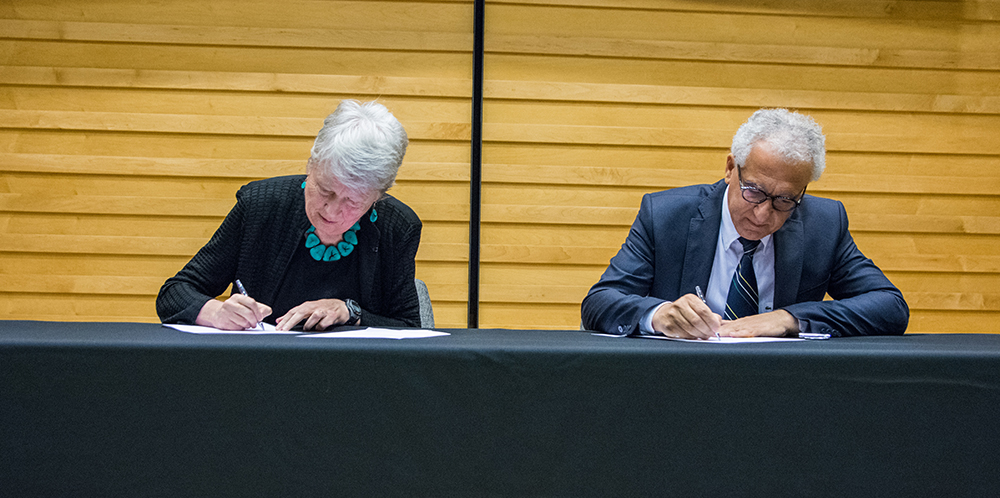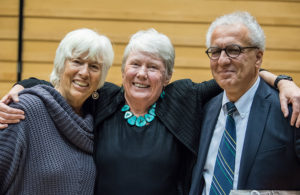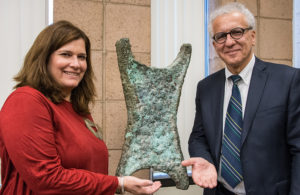HMC to Donate Cypriot Artifacts
December 13, 2018
During a ceremony on Dec. 11, Harvey Mudd College President Maria Klawe joined representatives from the University of Cyprus and members of the Mudd family to announce the donation of the College’s Cypriot artifact collection to the university.
“We have had for many years, artifacts that were brought from the island of Cyprus to Harvey Mudd’s home and later to HMC,” said Klawe. “It was a joy to have such rare and beautiful things at a tiny college like Harvey Mudd. But, I think we always felt that they were not really ours. They really belong on the island from which they were brought in the 1930s.”
Harvey S. Mudd, the namesake of the College, began collecting the artifacts after he became president of the Cyprus Mines Corporation on the island of Cyprus in 1916. Mudd exported many items to his home in California, and the Mudd family later donated them to the College. The collection, which has been housed at Harvey Mudd and Scripps colleges, includes an Athenian drinking vessel from the fifth century BCE; an oil lamp from 1500 BCE; and—the oldest item—a red, ceramic Cypriot drinking bowl circa 2,300–2,000 BCE.

Tory Mudd, Maria Klawe and Constantinos Christofides
In 2017, 100 years after Mudd began his collection, Vasiliki (Lina) Kassianidou, director of the Archaeological Research Unit in the Department of History and Archaeology at University of Cyprus, sent an email to Klawe expressing interest in researching the artifacts. That’s when a conversation began between Klawe, then Dean of the Faculty Jeff Groves and two of Harvey Mudd’s granddaughters, Victoria (Tory) Mudd and Caryll Sprague Mingst, about how the College and the University of Cyprus could do something collaboratively with the artifacts. “There were a number of possibilities that were explored,” said Klawe, “but, in the end, what really turned out to be the right thing was to repatriate all of these items as a gift to the University of Cyprus.”

Vasiliki (Lina) Kassianidou and Christofides
Victoria Mudd recalled marveling at the artifacts her grandfather had collected and traveling to Cyprus with her father, Henry T. Mudd, as a teenager. “Growing up with these ancient treasures nourished my imagination and my appreciation for the history of art, of ancient peoples and of the rich cultures that created them.”
One of these treasures is a Cypriot copper oxhide ingot. “The ingot is extremely important for the history of Cyprus,” said Kassianidou, who gave a presentation about the island and its history. Her research focuses on ancient technology, specifically the production and trade of Cypriot copper through antiquity but also its impact on the Cypriot landscape and environment. “It was kept very well here, but I think now the fact that its coming to the University of Cyprus, a new institution, is very symbolic.”
The University of Cyprus was established in 1989 and admitted its first students in 1992. Constantinos Christofides, rector of University of Cyprus, described the university as striving to attain the same level of excellence as Harvey Mudd College. “This is very important for us,” he said, “that the collection is coming from one academic institution to another.” Christofides said the artifacts “will be on display for all to see,” housed in its new, five-story library, the Stelios Ioannou Learning Resource Center, with space dedicated to the collection.
With the agreement between the two institutions in place, the work of transporting the artifacts begins. The collection’s antiquity, size (more than 200 items) and variety make shipping it the 7,000-plus miles from California to Cyprus a complicated endeavor. Once the collection has been catalogued and measured, size-specific packaging materials for each item will be made, as will custom shipping boxes. Though a shipping date has yet to be determined, packing is expected to begin early in 2019.
“It’s my hope the artifacts will inspire and instruct new generations of students and scholars to better understand and appreciate this rich history and our magnificent yet fragile world,” Victoria Mudd said. “The profundity of this moment touches us all.”
